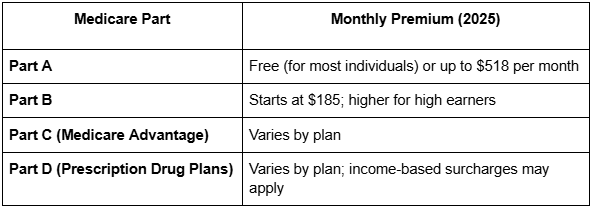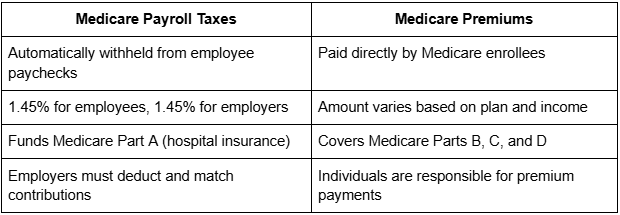What are Medicare premiums?
Medicare premiums are the monthly payments that individuals must make to maintain Medicare coverage. Medicare provides health insurance for people 65 and older and certain younger individuals with disabilities. Unlike Medicare payroll taxes, which fund Medicare Part A (hospital insurance) through payroll deductions, Medicare premiums apply to Parts B, C, and D and must be paid directly by enrollees.
Understanding how Medicare premiums impact employee benefits and payroll deductions is essential for businesses, especially when managing contributions for retired employees or workers transitioning to Medicare.
How do Medicare premiums work?
Medicare premiums vary depending on the type of Medicare coverage an individual chooses. These include:
- Medicare Part A (Hospital Insurance): Free for most individuals who have paid Medicare payroll taxes for at least 40 quarters (10 years). Otherwise, Part A requires a premium.
- Medicare Part B (Medical Insurance): Requires a monthly premium based on income, covering outpatient services like doctor visits and preventive care.
- Medicare Part C (Medicare Advantage): Private insurance plans that bundle Parts A and B, often with additional coverage; premiums vary by plan.
- Medicare Part D (Prescription Drug Coverage): Optional drug coverage with monthly premiums set by private insurers.
How much do Medicare premiums cost in 2025?
The cost of Medicare premiums depends on the specific plan and the individual’s income level:

For high-income earners, Income-Related Monthly Adjustment Amounts (IRMAA) can increase Part B and Part D premiums based on Modified Adjusted Gross Income (MAGI).
How do Medicare premiums affect employers?
Employers should know about Medicare-related payroll obligations and how they impact older employees transitioning to Medicare. Key considerations include:
- Medicare payroll tax deductions: Employers must withhold Medicare taxes from employee wages, separate from Medicare premiums.
- Medicare-eligible employees: Some employees continue working past 65 and may have employer-sponsored health insurance and Medicare.
- Medicare Secondary Payer (MSP) rules: If a business has 20 or more employees, employer-sponsored health insurance is primary, and Medicare is secondary.
- Retiree health benefits: Some businesses offer Medicare premium reimbursements or retiree health plans to cover costs.
How are Medicare premiums paid?
Unlike Medicare payroll taxes automatically deducted from wages, Medicare premiums must be paid directly by enrollees. Payment methods include:
- Social Security deductions: Premiums are deducted automatically for individuals receiving Social Security benefits.
- Direct billing: Medicare sends a bill for premiums to those not receiving Social Security yet.
- Automatic bank withdrawals: Enrollees can set up auto payments through their bank.
- Employer-sponsored retiree plans: Some employers assist retirees with Medicare premium payments.
What is the difference between Medicare payroll taxes and Medicare premiums?
While Medicare premiums are paid by enrollees, employers should understand their payment responsibilities for Medicare payroll taxes. Here’s a breakdown:

Medicare payroll tax withholdings can be a handful to manage without help. You can use payroll processing software to help automate tax deductions and compliance.
How Homebase helps businesses manage Medicare tax compliance
Tracking Medicare-related payroll deductions can be complex, but Homebase Payroll makes it easier by:
- Automatically withholding Medicare payroll taxes from employee wages.
- Ensuring payroll compliance with IRS tax rates and wage caps.
- Providing payroll reports that track employer tax liabilities.
- Helping businesses manage payroll for Medicare-eligible employees.
Sign up for Homebase today to ensure accurate payroll tax tracking and Medicare compliance.